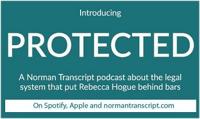Consumer protection is among the hallmarks of the office of Oklahoma Attorney General Gentner Drummond. He is an old-school Republican who despises waste and fraud and is more interested in serving voters than himself. Thus his warning about the Bitcoin ATM scams should be taken seriously.
But the Bitcoin con job he’s talking about – which is popping up in “virtual currency kiosks” in malls, grocery stores and gas stations – is scratching the surface. Several area residents have been victimized by Bitcon crooks who have hijacked their Facebook accounts. And unlike Drummond, Meta – the “parent” company for Facebook – doesn’t seem interested in doing anything about it.
As Drummond explained, the kiosks look like other ATMs, but instead of giving customers money from their bank accounts, the machines urge them to buy and send virtual currencies. Although many young people have viewed Bitcoin and other sketchy products as get-rich-quick schemes, the fake ATM victims are often elderly. They naively pull money from their bank accounts and deposit it into these kiosks, which are unregulated. Oftentimes, the scammers dispatch a message telling customers their banks are about to fail, and coax them into moving all their money into the kiosk. The “virtual” currency is sent into the crook’s “crypto wallet” – and most of the time, the transaction can’t be reserved. Many people have lost their entire savings this way.
Drummond’s advice: “Never pay anyone who demands an advance payment in cryptocurrency; only scammers demand this type of payment.” He cited a few other methods evildoers employ: Romance scams, which use fake online profiles to gain the trust of victims over time before demanding payment; pig butchering, wherein a text from an unknown number persuades victims to make investments; investment adviser scams, which involve bogus trading platforms, with the thief asking for the diversion of increasingly larger amounts of money; computer anti-virus protection, with victims getting pop-up alerts on their computers advising them to call a help desk for such protection, allowing a phony customer service staff who gains access to bank accounts; and impersonation, a favorite of crooks who claim to represent the IRS, FBI or some other agency, and use threats to get what they want.
Drummond and other law enforcement officials have long advised people to avoid withdrawing cash and giving it to anyone whose identity they aren’t 100% sure of – and that’s especially true with cryptocurrency. Those who believe they’ve been victimized should call 1-833-681-1895.
What about the Facebook hijackers who steal accounts and try to convince those on the friends list to invest in Bitcoin? Sadly, there’s not much recourse. TDP itself has reported at least two such cases to Facebook, and has been repeatedly advised the scam doesn’t violate its “community standards.” Once the scammer gets into an account, he’ll change the password, and the victim can never regain access. That means the loss of cherished photos and entire friends lists. After TDP staff made several attempts at getting Facebook to check out the scam, Facebook threw up its hands and sent a message stating its staff has been depleted by COVID. Maybe, but somehow we doubt Mark Zuckerberg’s bank accounts have been depleted.
Fierce First Amendment advocates believe free speech should not be stifled by social media, nor should the White House force their hands. But criminal behavior is another animal, and until social media behemoths are willing to take action, we must do it ourselves. If a Facebook friend begins to boast about the successes of Bitcoin investors, the best course of action is to let the friend know via email or text, not by Messenger. Always remember, “buyer beware.”













Commented
Sorry, there are no recent results for popular commented articles.